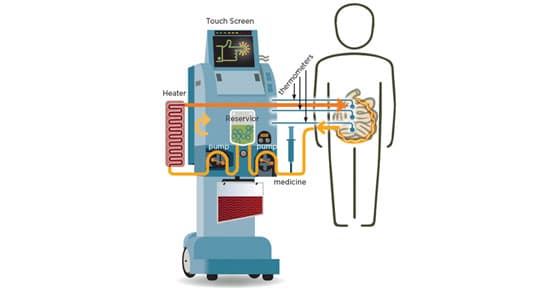Mesothelioma Treatment
When you choose UChicago Medicine for mesothelioma treatment, you’ll benefit from our team’s deep experience with this type of cancer, as well as personalized care.
Our mesothelioma experts are leaders in determining the best treatment for this rare disease and have a track record of setting the standard of care. In fact, one of the very first drugs to treat mesothelioma was developed at UChicago Medicine.
That dedication continues to this day. Our physicians are committed to finding the right treatment for each patient based on the stage of cancer, the biological characteristics of the tumor, and the patient's medical history and lifestyle.
Treatment for mesothelioma at UChicago Medicine is almost always a combination of the most effective methods, including surgery, intravenous systemic chemotherapy, radiation therapy, Hyperthermic Intraperitoneal Chemotherapy (HIPEC), and other targeted therapies. Here’s what your physician team may recommend.
Chemotherapy is one of the primary treatment options for mesothelioma, which is delivered intravenously to kill or slow the growth of cancer cells throughout the body. It’s typically used in combination with other treatments for mesothelioma patients. As part of the treatment process, our clinical team works with laboratory scientists to understand the biology of each patient’s disease so they can determine the right combination of medication.
Patients being treated with chemotherapy at UChicago Medicine are in good hands and will benefit from our team’s significant experience. Our physicians developed Pemetrexed (also known as Alimta) – the primary drug used in mesothelioma chemotherapy. Our physician scientists continue to perform research to identify new methods and medications for treatment.
This treatment uses high-energy radiation to target and destroy cancer cells or to shrink tumors. It is a standard and effective treatment option for many types of cancer, including mesothelioma. It’s typically used in combination with other treatments, such as surgery, HIPEC, chemotherapy, and immunotherapy, depending on the type and stage of cancer.
UChicago Medicine is home to one of the country's most experienced and well-respected radiation oncology teams. They are continuously developing new treatments and often have early access to the latest radiation technology, which can help better treat the disease.
The type of surgery recommended for mesothelioma depends on the stage of the disease, the tumor’s location and the patient’s overall health. Here are some of the procedures they may use in your treatment plan:
Extended Pleurectomy/Decortication (EP/D): This is the most common procedure for pleural mesothelioma. It involves the removal of the pleura (the lining of the lung and chest wall) and any visible tumors. In some cases, the diaphragm (breathing muscle) and pericardium (sac that contains the heart) are removed as well. The goal of the operation is to leave the lung in place and remove all visible tumor, which helps to maintain function and quality of life.
Extrapleural Pneumonectomy (EPP): This operation involves removal of the entire lung, as well as the pleural lining, diaphragm (breathing muscle), and pericardium (sac that contains the heart). While it was once the most common operation performed for pleural mesothelioma, it is now rarely used.
PleurX Catheter: The most common symptom for patients with pleural mesothelioma is shortness of breath, often from fluid made by the tumor. The PleurX catheter is a small tube that is surgically inserted between the ribs and meant to stay in place during treatment. It allows patients to drain fluid from their chest while at home, minimizing symptoms, and avoiding trips to the emergency room for drainage procedures.
Pleural Biopsy: To provide the right treatment for pleural mesothelioma, our physicians need to have an accurate picture of the microscopic details of the disease. The best and most accurate samples come from biopsies taken in the operating room. In this procedure, our surgeons insert a small camera into the chest cavity to guide them to the best possible biopsies.
Cytoreductive Surgery (CRS) with HIPEC (Hyperthermic Intraperitoneal Chemotherapy): This procedure involves removing visible tumors from the peritoneum and affected organs. After CRS, heated chemotherapy is administered directly into the abdominal cavity to target the remaining cancer cells.
Debulking Surgery: In this procedure, the goal is to remove as much of the tumor as possible when complete removal is not feasible. This can help reduce symptoms and improve the effectiveness of other treatments.
A key feature of the mesothelioma program at UChicago Medicine is HIPEC. This targeted treatment attacks the cancer cells with a combination of surgery and heated chemotherapy directly into the abdomen.
Immediately after removing visible tumors through what’s called cytoreductive surgery, our surgeons pump a potent dose of heated chemotherapy inside a patient’s abdomen to attack any remaining cancer cells in the area. After about 90 minutes of the infusion, the solution is washed out and incisions are closed.
A benefit of HIPEC is that it has fewer side effects than traditional chemotherapy because the cancer-fighting agents don’t circulate throughout the whole body.
Combining surgery with the HIPEC procedure and IV chemotherapy gives mesothelioma patients a better outcome and success in controlling the disease.
Our HIPEC team includes nationally renowned HIPEC surgeons, medical and radiation oncologists, radiologists, pathologists, nurses and cancer scientists. This level of HIPEC expertise is unmatched in the region.
Our experts have comprehensive experience with mesothelioma immunotherapy, which harnesses your immune system to recognize and attack cancer cells.
Several types of immunotherapy are approved to treat mesothelioma or are being studied through clinical trials. Some boost the immune system to work against cancer, while others train the immune system to seek out and attack cancer cells.
Immunotherapy treatments have shown promise in treating some types of mesothelioma by targeting specific proteins on the cancer cells.
New treatment options for mesothelioma
A top goal for UChicago Medicine physicians-scientists is to identify and develop treatment regimens that improve the quality of life for people with mesothelioma.
In the past, most cancer science focused on common forms of the disease. However, as we learn more about how existing cancer treatments can precisely target mesothelioma cells in laboratory testing, more mesothelioma patients are being included in clinical cancer trials.
Patients receiving mesothelioma treatment at UChicago Medicine can access many national cancer trials. Your doctors can help you determine if a mesothelioma clinical trial is right for you.
Start your mesothelioma treatment at UChicago Medicine
Call the UChicago Medicine Comprehensive Cancer Center to be seen by our mesothelioma team for the first time, or to get a second opinion on your mesothelioma diagnosis.

Cancer Care Second Opinions
Request a second opinion from UChicago Medicine experts in cancer care.

Participate in a Clinical Trial
Our physician-scientists are actively conducting clinical trials of new therapies for mesothelioma.

HIPEC: Targeted Heated Chemotherapy for Abdominal Cancers
HIPEC is targeted surgical technique that attacks abdominal cancer with fewer side effects than traditional chemotherapy.
